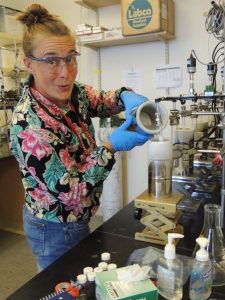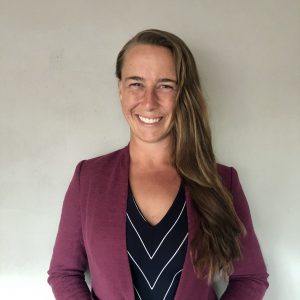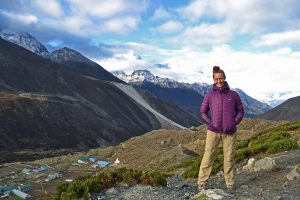October 8, 2019
AGU welcomes new Congressional Science Fellow, Dr. Kate Voss
Posted by bphilip
The American Geophysical Union (AGU) is pleased to announce its newest Congressional Science Fellow, Dr. Katalyn Voss. Now in its 42nd year, AGU’s Congressional Science Fellow program places highly qualified and accomplished scientists, engineers, and other professionals in the office of an individual member of Congress or on a committee for a one-year assignment. Dr. Voss, who started her fellowship in September, has been placed within the office of Sen. Tom Udall (NM).
Dr. Katalyn (Kate) Voss, who grew up as an active member of the Surfrider Foundation in southern California, has always been interested in grass-roots organization and advocacy around environmental issues. As an undergraduate in Georgetown University’s School of Foreign Service, Voss wanted to merge her policy knowledge with her interest in hydrology to study the global societal implications of groundwater shortages, but she soon realized that she needed to develop the technical skills to interpret satellite groundwater measurements, a field that was outside the expertise of researchers at Georgetown. To her, Georgetown’s Science, Technology, and International Affairs program is a “great combination of hard science as well as social science, economics, and politics, but definitely leans more towards the policy and economics side of things.”
She was ultimately awarded a National Science Foundation Research Experiences for Undergraduates (REU) fellowship that allowed her to study with Dr. James Famiglietti at UC Irvine, where she used NASA’s Gravity Recovery and Climate Experiment (GRACE) satellite to understand groundwater depletion in the Tigris-Euphrates river basin. She also worked with Dr. Famiglietti to assess the political and social drivers of groundwater depletion in the Central Valley of California to inform congressional testimony, and offered her a valuable experience to connect science and policy.
While deciding where her interest in science and policy should take her next, Voss realized that she would need a deeper understanding of hydrology if she wanted to make a larger impact. “If I want to inform water resources and climate, I really need to understand the hydrology,” she recalls. “If I want to recommend policies and actually understand what can be done on a boots-on-the-ground, ‘shovel in the dirt‘ kind of way, I’ve got to understand the science.” Pursuing a Ph.D. allowed her to develop the scientific understanding she was seeking, while also giving her the chance to learn how water availability impacted remote populations.
While developing her dissertation proposal to study water resources in Nepal, she spoke with local stakeholders to find out what knowledge and research projects they needed most. This approach — as well as her employment of local Nepalis as field assistants in her research — resulted in a great deal of trust between the scientists involved in the project and the local communities that were most impacted by her research. “[Involving locals] also gave me phenomenal insights to the watershed because these are communities that have lived there for hundreds of years”, says Voss. “They understand their watershed much better than I ever could in the course of a dissertation, so I was able to get information from them as well. And the results now have been spread out to those communities and to different NGOs and the government of Nepal.”

Kate participated in IsoCamp and learned about the many applications of stable isotopes for research applications.
Her interest in high mountain regions came from previous work with The Mountain Institute and researchers at UT-Austin in the Himalaya and the Peruvian Andes, where she learned about the local governments’ response to melting glaciers and glacial lake management strategies. This experience gave Voss insight into how governments use science to inform their decision making and underscored how critical partnerships between scientists and stakeholders are to developing solutions to pressing environmental problems. But it also exposed her to the difficulties in conducting research as an international scientist, a position that “comes with an ethical boundary in terms of how much you should be pushing for certain outcomes.” This served as an incentive for Voss to shift her focus to domestic issues in the U.S. and to “come back and engage on topics here, on natural resources management with water resources, agriculture, energy, and infrastructure.” Now, as a CSF in the office of Sen. Tom Udall (NM), Voss aims to bring her expertise to bear on critical issues facing the U.S. and is looking forward to “continue in this role as a liaison or translator, where I can incorporate everyone’s ideas and help move conversations forward.”
In a nod to her efforts to communicate with Nepalis in their own language, Voss says that over the next year in the Senate she is looking forward to “figuring out what that language is for the Hill, and I think the first few months are probably going to be this deep dive of learning and observing, and trying to understand the different players and how they communicate.” But most of all, Voss is excited to have arrived at this nexus of science, society and politics. “Maybe this is the geographer in me coming out,” says Voss, “since we’re trained to think across scales of space and time, I see this coming year working on the Hill as a perfect convergence of all these different spatial scales of policy and science.” And given that the CSF has been on her radar since before she started her Ph.D., Voss now has the opportunity to put all of her skills into practice. “While in the PhD., I needed to learn technical hydrology skills, but I needed to figure out how this works in practice – and now I get to do it,” she says. “I’m so excited, I don’t know if I can fully express how excited I am!”
Apply for the 2020-2021 Congressional Science Fellowship
To learn more about applying for an AGU Congressional Science Fellowship, visit the AGU Science Policy website. Applications for the 2020-2021 term will be open 15 October 2019 – 15 January 2020.



